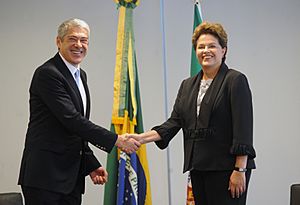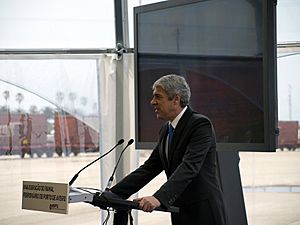José Sócrates facts for kids
Quick facts for kids
José Sócrates
|
|
|---|---|
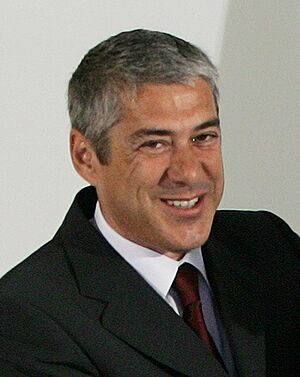
Sócrates in 2006
|
|
| Prime Minister of Portugal | |
| In office 12 March 2005 – 21 June 2011 |
|
| President | Jorge Sampaio Aníbal Cavaco Silva |
| Preceded by | Pedro Santana Lopes |
| Succeeded by | Pedro Passos Coelho |
| Secretary-General of the Socialist Party | |
| In office 27 September 2004 – 23 July 2011 |
|
| President | António de Almeida Santos |
| Preceded by | Eduardo Ferro Rodrigues |
| Succeeded by | António José Seguro |
| Minister of Social Infrastructure | |
| In office 23 January 2002 – 6 April 2002 |
|
| Prime Minister | António Guterres |
| Preceded by | Eduardo Ferro Rodrigues |
| Succeeded by | Luís Valente de Oliveira |
| Minister of the Environment | |
| In office 25 October 1999 – 6 April 2002 |
|
| Prime Minister | António Guterres |
| Preceded by | Elisa Ferreira |
| Succeeded by | Isaltino Morais |
| Minister in the Cabinet of the Prime Minister | |
| In office 25 November 1997 – 25 October 1999 |
|
| Prime Minister | António Guterres |
| Preceded by | Jorge Coelho |
| Succeeded by | Armando Vara |
| Secretary of State Assistant to the Minister of the Environment | |
| In office 30 October 1995 – 25 November 1997 |
|
| Prime Minister | António Guterres |
| Preceded by | Joaquim Poças Martins António Taveira da Silva |
| Succeeded by | José Guerreiro |
| Member of the Assembly of the Republic | |
| In office 13 August 1987 – 22 June 2011 |
|
| Constituency | Castelo Branco |
| Personal details | |
| Born |
José Sócrates Carvalho Pinto de Sousa
6 September 1957 Vilar de Maçada, Alijó, Portugal |
| Political party | Independent (2018–present) |
| Other political affiliations |
Social Democratic Party (1974–1981) Socialist Party (1981–2018) |
| Spouse | Sofia Costa Pinto Fava (Divorced) |
| Children | 2 |
| Alma mater | Polytechnic Institute of Coimbra Lusíada University Polytechnic Institute of Lisbon Independente University University Institute of Lisbon |
| Signature | |
José Sócrates (born 6 September 1957) is a Portuguese politician. He served as the prime minister of Portugal from 2005 to 2011. During the second half of 2007, he was also the president of the Council of the European Union.
Sócrates grew up in the city of Covilhã. He joined the Socialist Party in 1981 and became a member of parliament in 1987. He joined the government in 1995 as Secretary of State for Environment. Later, he became Minister of Youth and Sports, helping to organize the UEFA Euro 2004 football tournament in Portugal. In 1999, he became Minister for Environment.
In 2004, José Sócrates was chosen as the leader of the Socialist Party. His party won the 2005 election, giving them a strong majority. During his time as prime minister, Portugal faced economic challenges. His government worked to improve public finances and make changes to how the country was run. He also played a role in international affairs, helping to finalize the Lisbon Treaty for the European Union.
In 2009, his party lost its majority in the election, but he continued as prime minister. Portugal's economic situation became more difficult, leading to a financial crisis. In 2011, Sócrates resigned after Parliament did not approve new economic measures. Portugal then asked for financial help from international organizations. After losing the 2011 election, he stepped down as the leader of the Socialist Party.
Biography
Early Life and Education
José Sócrates was born in Porto on 6 September 1957. He spent his childhood and teenage years in Covilhã. His parents were Fernando Pinto de Sousa and Maria Adelaide de Carvalho Monteiro. He had two younger siblings.
Sócrates studied in Covilhã until he was 18. In 1975, he went to Coimbra for higher education. He earned a degree in civil engineering in 1979. Later, he studied law and civil engineering further. In 2005, he earned an MBA degree. After being prime minister, he studied political science in Paris at the Institut d'Etudes Politiques de Paris, earning a master's degree in 2013.
Political Journey
José Sócrates was one of the founders of the youth branch of the PSD before joining the Socialist Party in 1981. He worked as a technical engineer for the Covilhã City Council. From 1987, he was elected as a member of the Portuguese Parliament, representing the Castelo Branco area.
He became a spokesperson for environmental issues for the Socialist Party from 1991 to 1995. In 1995, he joined the government as Secretary of State for Environment under Prime Minister António Guterres. Two years later, Sócrates became Minister for Youth and Sports, where he helped organize the UEFA Euro 2004 football championship in Portugal. In 1999, he became Minister for Environment.
After the 2002 elections, Sócrates became a member of the opposition in the Portuguese Parliament. In 2004, he was elected leader of the Socialist Party. Following his party's victory in the 2005 election, President Jorge Sampaio asked him to form a new government. He was elected for a second term as prime minister after the 2009 election. He also served as a member of the Portuguese Council of State.
Personal Life
Sócrates is divorced from Sofia Costa Pinto Fava, an engineer. They have two sons, José Miguel and Eduardo. He lives in Lisbon and has also lived in Ericeira. He is a supporter of the SL Benfica football club.
Prime Minister of Portugal
After the 2005 election, José Sócrates became prime minister on 12 March 2005. His first government was known as the XVII Constitutional Government.
He was re-elected in the 2009 election and began his second term on 26 October 2009. This was the XVIII Constitutional Government.
On 5 June 2011, after the 2011 election, the Social Democratic Party won. This led to Sócrates resigning as the leader of the Socialist Party and as prime minister.
Sócrates' Cabinet Members
Here are some of the ministers who served in José Sócrates' governments:
| Ministry | Incumbent | Term |
|---|---|---|
| State and Internal Administration | António Costa | 13 March 2005 – 17 May 2007 |
| Rui Pereira | 17 May 2007 – 21 June 2011 | |
| State and Foreign Affairs | Diogo Freitas do Amaral | 13 March 2005 – 3 July 2006 |
| Luís Amado | 3 July 2006 – 21 June 2011 | |
| State and Finances | Luís Campos e Cunha | 13 March – 21 July 2005 |
| Fernando Teixeira dos Santos | 21 July 2005 – 21 June 2011 | |
| Presidency | Pedro Silva Pereira | 13 March 2005 – 21 June 2011 |
| National Defence | Luís Amado | 13 March 2005 – 3 July 2006 |
| Nuno Severiano Teixeira | 3 July 2006 – 26 October 2009 | |
| Augusto Santos Silva | 2 October 2009 – 21 June 2011 | |
| Justice | Alberto Costa | 13 March 2005 – 26 October 2009 |
| Alberto Martins | 26 October 2009 – 21 June 2011 | |
| Environment | Francisco Nunes Correia | 13 March 2005 – 26 October 2009 |
| Dulce Álvaro Pássaro | 26 October 2009 – 21 June 2011 | |
| Economy, Innovation and Development | Manuel Pinho | 13 March 2005 – 2 July 2009 |
| Fernando Teixeira dos Santos | 2 July – 26 October 2009 | |
| José Vieira da Silva | 26 October 2009 – 21 June 2011 | |
| Agriculture | Jaime Silva | 13 March 2005 – 26 October 2009 |
| António Soares Serrano | 26 October 2009 – 21 June 2011 | |
| Public Works and Communications | Mário Lino | 13 March 2005 – 26 October 2009 |
| António Augusto Mendonça | 26 October 2009 – 21 June 2011 | |
| Labour and Social Solidarity | José Vieira da Silva | 13 March 2005 – 26 October 2009 |
| Maria Helena André | 26 October 2009 – 21 June 2011 | |
| Health | António Correia de Campos | 13 March 2005 – 30 January 2008 |
| Ana Jorge | 30 January 2008 – 21 June 2011 | |
| Education | Maria de Lurdes Rodrigues | 13 March 2005 – 26 October 2009 |
| Isabel Alçada | 26 October 2009 – 21 June 2011 | |
| Science, Technology and High Education | Mariano Gago | 13 March 2005 – 21 June 2011 |
| Culture | Isabel Pires de Lima | 13 March 2005 – 30 January 2008 |
| José António Pinto Ribeiro | 30 January 2008 – 26 October 2009 | |
| Gabriela Canavilhas | 26 October 2009 – 21 June 2011 | |
| Parliamentary Affairs | Augusto Santos Silva | 13 March 2005 – 26 October 2009 |
| Jorge Lacão | 26 October 2009 – 21 June 2011 |
Major Policies and Initiatives
Administrative Reforms
Sócrates' government worked to make the public sector more efficient. They aimed to reduce bureaucracy for citizens and businesses. Programs like "SIMPLEX" helped simplify administrative and legal processes. The government also improved the welfare system and changed retirement rules. Portugal's public administration became more modern, using information technology, which was praised by the European Commission.
Technological Plan
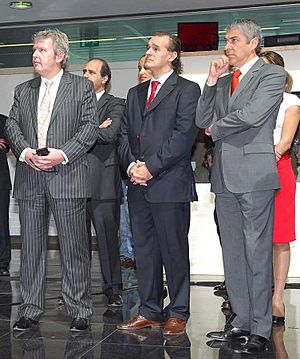
A key policy was the "Technological Plan," designed to make Portugal more competitive. It focused on knowledge, technology, and innovation. One notable project was the "Magalhães" netbook, a low-cost computer for children, assembled by a Portuguese company. This plan helped Portugal improve its innovation ranking in Europe.
Educational Reforms
The government put more resources into education. They improved professional technical education programs. They also provided more financial support for students and introduced systematic evaluations for schools and teachers. The pan-European Bologna Process, which helps make higher education degrees more similar across Europe, was fully put into practice in Portugal.
A program called "Novas Oportunidades" (New Opportunities) was created for adults who wanted to get higher education qualifications based on their life experience, without going back to traditional school. This aimed to improve the education levels of adults in Portugal.
According to the OECD's Programme for International Student Assessment (PISA), Portuguese students showed significant improvement in reading, mathematics, and science skills during this period.
Transportation Developments
Prime Minister Sócrates' government supported building new transportation infrastructure. This included plans for a new airport for Lisbon and a high-speed rail network. After studying different locations, the government chose Alcochete as the best site for the new Lisbon airport.
Other Policies
In 2010, Same-sex marriage in Portugal was made legal. Also, in 2009, a law was passed to make the rights of fathers and mothers equal. The government also increased the police force and provided new equipment to help reduce crime rates. Various measures were also put in place to help families, young people, and pensioners.
Presidency of the Council of the European Union
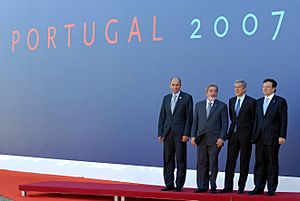
As prime minister, José Sócrates led the presidency of the Council of the European Union from July to December 2007. During this time, he focused on strengthening relations between the EU and countries like Brazil and the African Union. A major achievement was the approval of the Treaty of Lisbon, which updated how the European Union works.
Economic Challenges
From 2005 to 2010, Portugal faced growing economic difficulties. The country experienced slow economic growth and high unemployment. By the late 2000s, a debt crisis in Europe led to large government deficits and even higher unemployment in Portugal.
In September 2010, the government announced new measures to reduce its budget deficit, including tax increases and salary cuts for public workers. These steps were taken to address the country's financial problems.
On 6 April 2011, after resigning as prime minister, Sócrates announced that Portugal would need financial help from the IMF and the European Financial Stability Facility. This was a difficult time for the country's economy.
Government Resignation
On 23 March 2011, Sócrates resigned as prime minister. This happened after Parliament rejected a new set of economic measures proposed by his government. He had stated that he would resign if the measures were not approved. This led to a new election being held on 5 June 2011.
After his party lost the 2011 election, José Sócrates resigned from his position as Secretary-General of the Socialist Party.
Electoral History
PS Leadership Election, 2004
| Candidate | Votes | % | |
|---|---|---|---|
| José Sócrates | 18,432 | 78.6 | |
| Manuel Alegre | 3,903 | 16.7 | |
| João Soares | 927 | 4.0 | |
| Blank/Invalid ballots | 175 | 0.7 | |
| Turnout | 23,437 | ||
| Source: Resultados | |||
Legislative Election, 2005
| Party | Candidate | Votes | % | Seats | +/− | |
|---|---|---|---|---|---|---|
| PS | José Sócrates | 2,588,312 | 45.0 | 121 | +25 | |
| PSD | Pedro Santana Lopes | 1,653,425 | 28.8 | 75 | –30 | |
| CDU | Jerónimo de Sousa | 433,369 | 7.5 | 14 | +2 | |
| CDS–PP | Paulo Portas | 416,415 | 7.3 | 12 | –2 | |
| BE | Francisco Louçã | 364,971 | 6.4 | 8 | +5 | |
| Other parties | 122,127 | 2.1 | 0 | ±0 | ||
| Blank/Invalid ballots | 169,052 | 2.9 | – | – | ||
| Turnout | 5,747,834 | 64.26 | 230 | ±0 | ||
| Source: Comissão Nacional de Eleições | ||||||
Legislative Election, 2009
| Party | Candidate | Votes | % | Seats | +/− | |
|---|---|---|---|---|---|---|
| PS | José Sócrates | 2,077,238 | 36.6 | 97 | –24 | |
| PSD | Manuela Ferreira Leite | 1,653,665 | 29.1 | 81 | +6 | |
| CDS–PP | Paulo Portas | 592,778 | 10.4 | 21 | +9 | |
| BE | Francisco Louçã | 557,306 | 9.8 | 16 | +8 | |
| CDU | Jerónimo de Sousa | 446,279 | 7.9 | 15 | +1 | |
| Other parties | 178,012 | 3.1 | 0 | ±0 | ||
| Blank/Invalid ballots | 175,980 | 3.1 | – | – | ||
| Turnout | 5,681,258 | 59.68 | 230 | ±0 | ||
| Source: Comissão Nacional de Eleições | ||||||
Legislative Election, 2011
| Party | Candidate | Votes | % | Seats | +/− | |
|---|---|---|---|---|---|---|
| PSD | Pedro Passos Coelho | 2,159,181 | 38.7 | 108 | +27 | |
| PS | José Sócrates | 1,566,347 | 28.0 | 74 | –23 | |
| CDS–PP | Paulo Portas | 653,888 | 11.7 | 24 | +3 | |
| CDU | Jerónimo de Sousa | 441,147 | 7.9 | 16 | +1 | |
| BE | Francisco Louçã | 288,923 | 5.2 | 8 | –8 | |
| PCTP/MRPP | Garcia Pereira | 62,610 | 1.1 | 0 | ±0 | |
| PAN | Paulo Borges | 57,995 | 1.0 | 0 | new | |
| Other parties | 126,521 | 2.3 | 0 | ±0 | ||
| Blank/Invalid ballots | 228,017 | 4.1 | – | – | ||
| Turnout | 5,585,054 | 58.03 | 230 | ±0 | ||
| Source: Comissão Nacional de Eleições | ||||||
Images for kids
See also
 In Spanish: José Sócrates para niños
In Spanish: José Sócrates para niños
 | Georgia Louise Harris Brown |
 | Julian Abele |
 | Norma Merrick Sklarek |
 | William Sidney Pittman |


